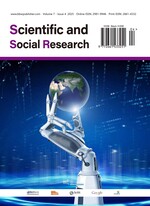Abstract
The Dunning-Kruger effect is a purported bias of human metacognitive insight in which people who are incompetent in a given domain are unaware of their incompetence. In this exploratory study, a random sample of twenty-eight postgraduate students from the Fujian Normal University was selected to test this possibility. The results show that the grammar area basically follows the theory raised in the Dunning-Kruger effect — the top quartile students (those achieving above 75% in the test) showed a tendency to underpredict their test performance. Those who scored in the bottom 25% tended to overestimate their ability and test scores. Even when they are aware of what skilled performance would look like, individuals who are unskilled in a grammar domain might overestimate their performance.
References
Kahneman D, Tversky A, 1974, Judgment under Uncertainty: Heuristics and Biases. Science, 185(4157): 1124–1131.
Kruger J, Dunning D, 1999, Unskilled and Unaware of it: How Difficulties in Recognizing one’s own Incompetence Lead to Inflated Self-assessments. Journal of Personality and Social Psychology, 77(6): 1121–1134.
Huang S, 2013, When Peers are not Peers and Don’t Know it: The Dunning-Kruger Effect and Self-fulfilling Prophecy in Peer-review. BioEssays: News and Reviews in Molecular, Cellular and Developmental Biology, 35(5): 414–416.
Nuhfer E, Fleisher S, Cogan C, 2017, How Random Noise and a Graphical Convention Subverted Behavioral Scientists’ Explanations of Self-assessment Data: Numeracy Underlies Better Alternatives. Numeracy, 10(1): 1–31.
Gignac GE, Zajenkowski M, 2020, The Dunning-Kruger Effect is (mostly) a Statistical Artefact: Valid Approaches to Testing the Hypothesis with Individual Differences Data. Intelligence, 2020(80): 101449.
Simons DJ, 2013, Unskilled and Optimistic: Overconfident Predictions despite Calibrated Knowledge of Relative Skill. Psychonomic Bulletin & Review, 20(3): 601–607.
Kruger J, 1999, Lake Wobegon be Gone! The “Below-average Effect” and the Egocentric Nature of Comparative Ability Judgments. Journal of Personality and Social Psychology, 77(2): 221–232.
Mahmood K, 2016, Do People Overestimate their Information Literacy Skills? A Systematic Review of Empirical Evidence on the Dunning-Kruger Effect. Communications in Information Literacy, 10(2): 199–213.
Pennycook G, Ross RM, Koehler DJ, et al., 2017, Dunning-Kruger Effects in Reasoning: Theoretical Implications of the Failure to Recognize Incompetence. Thinking & Reasoning, 24(2): 161–183.
Sanchez C, Dunning D, 2018, Overconfidence among Beginners: Is a Little Learning a Dangerous Thing? Journal of Personality and Social Psychology, 114(1): 10–28.
McIntosh RD, Fowler EA, Lyu T, et al., 2019, Wise Up: Clarifying the Role of Metacognition in the Dunning-Kruger Effect. Journal of Experimental Psychology: General, 148(11): 1882–1897.
Burson KA, Larrick RP, Klayman J, 2006, Skilled or Unskilled, but still Unaware of it: How Perceptions of Difficulty Drive Miscalibration in Relative Comparisons. Journal of Personality and Social Psychology, 90(1): 60–77.
Ehrlinger J, Dunning D, 2003, How Chronic Self-Views Influence (and Potentially Mislead) Estimates of Performance. Journal of Personality and Social Psychology, 84(1): 5–17.
Ames DR, Kammrath LK, 2004, Mind-Reading and Metacognition: Narcissism, not Actual Competence, Predicts Self-Estimated Ability. Journal of Nonverbal Behavior, 28(3): 187–209.
Schlosser T, Dunning D, Johnson KL, et al., 2013, How Unaware are the Unskilled? Empirical Tests of the “Signal Extraction” Counter Explanation for the Dunning-Kruger Effect in Self-evaluation of Performance. Journal of Economic Psychology, 2013(39): 85–100.
